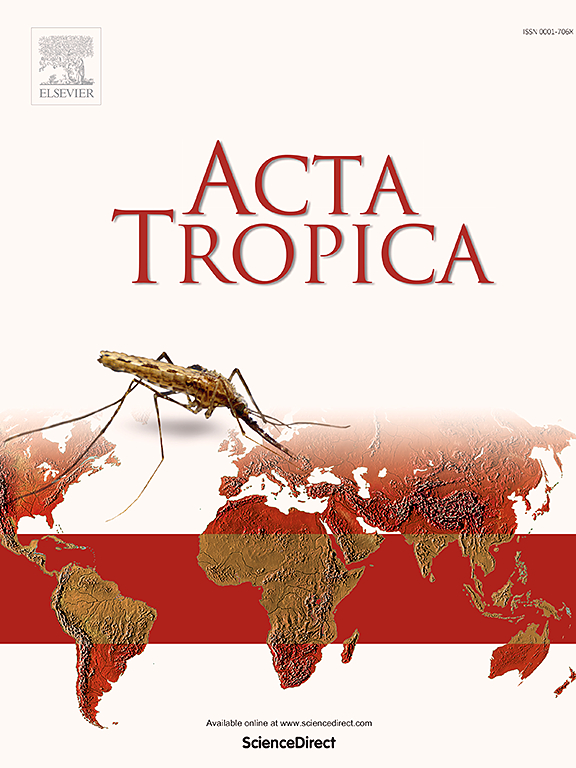中国广西华支睾吸虫感染的决定因素及后续治疗:一项定性研究。
IF 2.1
3区 医学
Q2 PARASITOLOGY
引用次数: 0
摘要
华支睾吸虫病是由食用含有华支睾吸虫病囊蚴的生淡水鱼引起的。支睾吸虫病在东亚,特别是中国造成了很高的负担。治疗是强制性的,以控制发病率,而在高流行地区建议大量给药和选择性给药。很少实施定性研究来探索对支睾吸虫病的知识、态度和实践(KAP)以及治疗。2024年,在中国广西宾阳县两个支睾吸虫病流行村进行了定性横断面研究。共进行了10次焦点小组讨论,涉及52人(10名村领导、2名村医生和40名村民)。访谈的重点是了解华支睾吸虫病的危害、传播、治疗和预防,以及对食生淡水鱼和治疗的态度和做法。采用主题分析方法对记录的数据进行人工转录和分析。约有一半(25/52)的参与者报告有食用“鱼生”的习惯,其中男性的比例(84.00%,21/25)高于女性(16.00%,4/25),这与饮食偏好和社会角色的差异有关。尤其是节日宴请是男性摄入“食生”的重要因素。尽管76.92%(40/52)的参与者承认摄入“鱼生”可能带来健康风险,但大多数人不知道中华绿僵菌引起的严重疾病。此外,一些人对“鱼生”的额外营养价值有误解。大多数参与者(88.46%,46/52)未接受过支睾吸虫病治疗。研究对象在确诊感染后倾向于服药,未服用“愈生”的个体服药依从性较低。此外,药物的价格和给药方式也影响了他们的选择。村领导和医生认为实施支睾吸虫病控制的重要性,并建议进行健康教育以提高治疗依从性。在研究地区,华支睾吸虫病的流行受文化认同、知识不足和误解的驱动,在不同人群中表现出显著差异。治疗的选择受明确的诊断和个人的饮食习惯的高度影响,这可能会阻碍在人群水平上采用药物给药。为了控制和预防支睾吸虫病,建议进行健康教育,增加对其危害和后续用药重要性的认识。本文章由计算机程序翻译,如有差异,请以英文原文为准。
Determinants of Clonorchis sinensis infection and subsequent treatment: a qualitative study in Guangxi, China
Clonorchiasis is caused by the ingestion of raw freshwater fish containing the metacercariae of Clonorchis sinensis. High burden is exerted by clonorchiasis in East Asia, especially in China. Treatment is compulsory to control the morbidity, while mass drug administration and selective drug administration are recommended in high endemic areas. Few qualitative studies have been implemented to explore the knowledge, attitudes, and practices (KAP) towards clonorchiasis as well as the treatment. In 2024, a qualitative cross-sectional study was conducted in two clonorchiasis-endemic villages of Binyang county, Guangxi, China. A total of ten focus group discussions (FGDs) were carried out, involving 52 participants (10 village leaders, 2 village doctors and 40 villagers). Interview focused on the knowledge on harm, transmission, treatment and prevention of clonorchiasis, and attitudes and practices to ingesting raw freshwater fish (“yusheng”) and treatment. Recorded data were transcribed and analyzed manually by using thematic analysis. About half of the participants (25/52) reported the practice of consuming “yusheng”, with a higher percentage in males (84.00 %, 21/25) than in females (16.00 %, 4/25), which is relevant to the differences in dietary predilection and social roles. Especially, a dinner party at festivals is an important contributor in male’s ingestion of “yusheng”. Although 76.92 % of the participants (40/52) acknowledged the potential health risks associated with the ingestion of “yusheng”, most were unaware of the severe morbidities caused by C. sinensis. Furthermore, some people hold a misconception on the additional nutritional value of “yusheng”. Most of the participants (88.46 %, 46/52) had not undergone treatment for clonorchiasis. The participants tended to take medicine while a definite diagnosis of infection was made, and especially low compliance was demonstrated in the individuals without the practice of ingesting “yusheng”. Additionally, the price of the drug and delivery approach also impacted their choices. Village leaders and doctors believed the importance to implement control for clonorchiasis, and health education was suggested to increase the compliance in treatment. In the studied areas, the endemicity of clonorchiasis is driven by the cultural identification, inadequate knowledge, as well as misconception, which demonstrate significant difference in different populations. The choice of treatment is highly impacted by the definite diagnosis and individual’s dietary habit, which may hinder the adoption of drug administration at population level. To control and prevent clonorchiasis, health education is suggested to increase the knowledge including the harm and importance of subsequent drug administration.
求助全文
通过发布文献求助,成功后即可免费获取论文全文。
去求助
来源期刊

Acta tropica
医学-寄生虫学
CiteScore
5.40
自引率
11.10%
发文量
383
审稿时长
37 days
期刊介绍:
Acta Tropica, is an international journal on infectious diseases that covers public health sciences and biomedical research with particular emphasis on topics relevant to human and animal health in the tropics and the subtropics.
 求助内容:
求助内容: 应助结果提醒方式:
应助结果提醒方式:


